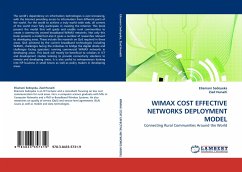The world's dependency on information technologies is ever-increasing, with the Internet providing access to information from different parts of the world. For the world to achieve a truly world wide web, all corners of the world must fully participate in creating the Internet. This book present the model that will guide and enable rural communities to create a community owned broadband WiMAX networks. Not only this book presents a model but also it gives a number of researches relevant to developing areas. These include the research on QoS required in these areas, QoS achieved by the current broadband technologies including WiMAX, challenges facing the initiatives to bridge the digital divide and challenges facing operators running commercial WiMAX networks in developing areas. This book will mostly be beneficial to scholars in ICT and development studies looking to provide connectivity solutions to remote and developing areas. It is also useful to entrepreneurs looking into ISPbusiness in small towns as well as policy makers in developing areas.
Bitte wählen Sie Ihr Anliegen aus.
Rechnungen
Retourenschein anfordern
Bestellstatus
Storno








